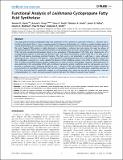Functional analysis of Leishmania cyclopropane fatty acid synthetase
View/
Date
10/12/2012Author
Grant ID
067441/Z/02/B
086658 Z 08 Z
Keywords
Metadata
Show full item recordAbstract
The single gene encoding cyclopropane fatty acid synthetase (CFAS) is present in Leishmania infantum, L. mexicana and L. braziliensis but absent from L. major, a causative agent of cutaneous leishmaniasis. In L. infantum, usually causative agent of visceral leishmaniasis, the CFAS gene is transcribed in both insect (extracellular) and host (intracellular) stages of the parasite life cycle. Tagged CFAS protein is stably detected in intracellular L. infantum but only during the early log phase of extracellular growth, when it shows partial localisation to the endoplasmic reticulum. Lipid analyses of L. infantum wild type, CFAS null and complemented parasites detect a low abundance CFAS-dependent C19 Delta fatty acid, characteristic of a cyclopropanated species, in wild type and add-back cells. Sub-cellular fractionation studies locate the C19 Delta fatty acid to both ER and plasma membrane-enriched fractions. This fatty acid is not detectable in wild type L. major, although expression of the L. infantum CFAS gene in L. major generates cyclopropanated fatty acids, indicating that the substrate for this modification is present in L. major, despite the absence of the modifying enzyme. Loss of the L. infantum CFAS gene does not affect extracellular parasite growth, phagocytosis or early survival in macrophages. However, while endocytosis is also unaffected in the extracellular CFAS nulls, membrane transporter activity is defective and the null parasites are more resistant to oxidative stress. Following infection in vivo, L. infantum CFAS nulls exhibit lower parasite burdens in both the liver and spleen of susceptible hosts but it has not been possible to complement this phenotype, suggesting that loss of C19 Delta fatty acid may lead to irreversible changes in cell physiology that cannot be rescued by re-expression. Aberrant cyclopropanation in L. major decreases parasite virulence but does not influence parasite tissue tropism.
Citation
Oyola , S O , Evans , K J , Smith , T K , Smith , B A , Hilley , J D , Mottram , J C , Kaye , P M & Smith , D F 2012 , ' Functional analysis of Leishmania cyclopropane fatty acid synthetase ' , PLoS One , vol. 7 , no. 12 , e51300 . https://doi.org/10.1371/journal.pone.0051300
Publication
PLoS One
Status
Peer reviewed
ISSN
1932-6203Type
Journal article
Collections
Items in the St Andrews Research Repository are protected by copyright, with all rights reserved, unless otherwise indicated.

